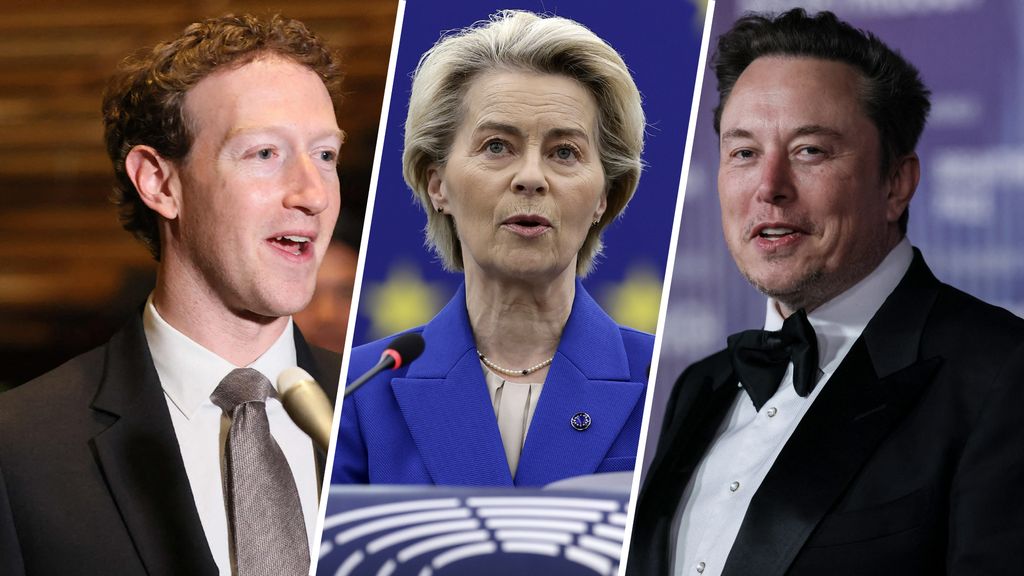
This article was last updated on January 10, 2025
Canada: ![]() Oye! Times readers Get FREE $30 to spend on Amazon, Walmart…
Oye! Times readers Get FREE $30 to spend on Amazon, Walmart…
USA: ![]() Oye! Times readers Get FREE $30 to spend on Amazon, Walmart…
Oye! Times readers Get FREE $30 to spend on Amazon, Walmart…
Table of Contents
What can Europe do against the all-powerful tech companies?
Political Europe is under increasing pressure from foreign tech companies. For example, there are concerns that tech billionaire Elon Musk is trying to influence European politics through his social media platform X.
Last night Elon Musk went in conversation with Alice Weidel, CEO of the radical right-wing Alternative for Germany party. There will be elections in the country next month and Musk makes no secret of his support for the AfD.
According to the website Politico, no fewer than 150 European officials followed the conversation yesterday with a keen eye to ensure that nothing happened that did not comply with European law. An investigation into X is already underway in Brussels.
Different European leaders have strongly condemned Musk’s interference. But it is not just Musk who is causing the EU headaches. Digital threats seem to be coming at Europe from all sides.
European supervision
Tech giant Meta announced this week to reduce strict moderation in the US and to stop fact-checking messages. Yesterday sources told NOS that the first step has already been taken for a similar change in the EU. And last month saw the first round of presidential elections in Romania declared invalid due to Russian interference via the Chinese TikTok.
Since 2022, the European Union has had legislation that attempts to regulate large tech companies, the so-called DSA. This “digital services law” makes those companies responsible for, among other things, combating disinformation, influencing elections and spreading hate messages. They are obliged to limit the risks in this regard.
Platforms with more than 45 million monthly users in the EU, also known as VLOPs (very large online platforms), are directly supervised by the European Commission.
Fines for tech companies
If the European Commission suspects that a tech giant is not complying with the rules, they can ask the company for information. Based on that information, the Commission may decide to open an investigation against the company.
The European Commission currently has several to research to walk. In addition to X, there are also suspicions against AliExpress, Meta, TikTok and Temu that they are not adhering to the rules.
During such an investigation, the European Commission is given far-reaching powers. For example, officials can view the algorithms of the platforms and carry out inspections. If the investigation shows that the company does not comply with the rules, the European Commission can impose a fine of up to 6 percent of global annual turnover. No fines have been issued so far.
Yet the law has already achieved results. For example, LinkedIn announced that it would stop personalized advertisements after the European Commission asked the company for information. And TikTok announced last year that it would no longer work with a reward system after the European Commission threatened a temporary ban on that system due to concerns about addiction in children.
The European Commission therefore has legal options to put further pressure on Musk and Zuckerberg. But there is also a geopolitical reality. And that brings with it all kinds of dilemmas.
Keeping Trump friendly
Because for the time being, the European Union’s strategy appears to be to keep incoming President Trump on friendly terms and to tempt him into cooperation. And not: hitting him in the head with lawsuits against one of his most important advisors, Elon Musk.
But it is unclear how long that strategy can survive. Musk and Zuckerberg say out loud that they do not want to care about the European law that regulates tech companies. The EU cannot simply ignore this. A Union that does not enforce its own laws loses credibility.
But incoming Vice President Vance previously said that if the European Commission continues to regulate a tech company like X, America will leave NATO. It is therefore politically very sensitive to take steps against the large tech companies.
‘The EU must stand up now’
Kim van Sparrentak, MEP for GroenLinks-PvdA, calls on the Commission to do so and as an EU to enter into the “titanic struggle” with Trump and his “techoligarchy”.
According to her, Musk is using X to divide and weaken Europe and threatens the same for Zuckerberg’s platforms, including Facebook and Instagram. “Right now the EU must stand up to defend democratic values in the online public debate,” says Van Sparrentak.
Her VVD colleague Bart Groothuis is also critical of the attitude of the European Commission so far. “The silence about possible unwanted foreign influence on the German elections and violation of the DSA is deafening,” he says. “Europe must respond unequivocally when it is established that laws are being broken.”
The responsible European Commissioner, the Finnish Henna Virkkunen, wrote a letter to MEPs earlier this week with the message that the Commission intends to “energistically” continue the ongoing investigation into to come.”
A decision on next steps in the ongoing investigation into X will be taken at the highest political level, by committee chairman Ursula von der Leyen herself. Whether she will ultimately take legal action against Musk remains to be seen.

Be the first to comment